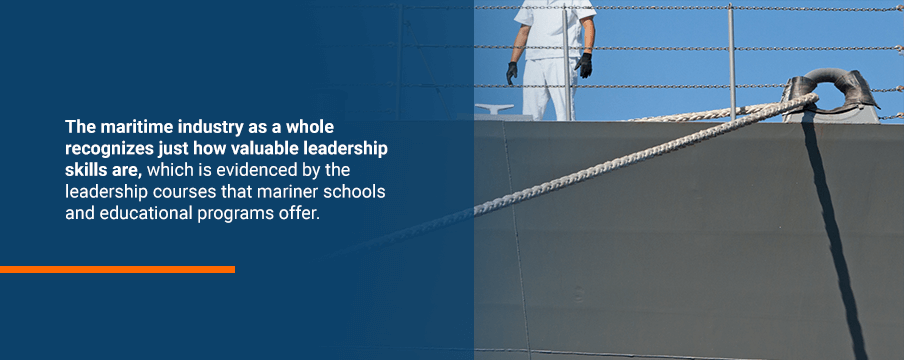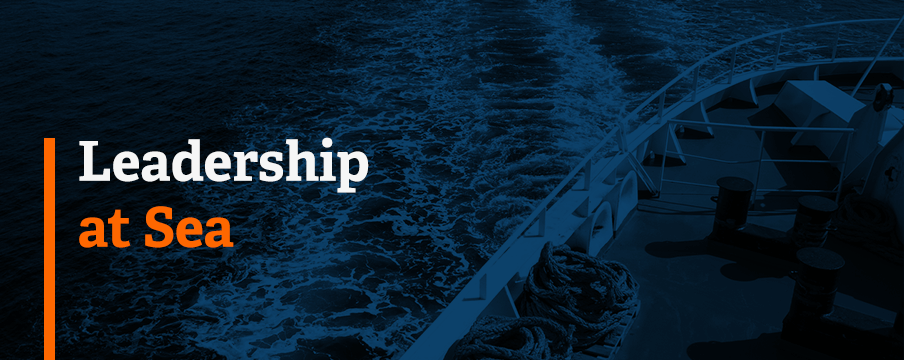Importance of Leadership | What Makes a Good Leader | How to Develop Leaders | How Leadership Can Affect Your Career | Take Leadership Courses
From global trade and passenger transport to national defense and more, the maritime industry plays a critical role in the world. For a ship to function as it needs to, every mariner must do their part. As with any team, leaders are necessary to provide directives and oversee the crew. At every level, crewmembers must exercise leadership skills to bring out the best in both themselves and their fellow mariners.
Leadership is a buzzword that is cast around a lot across industries, but it’s especially critical for mariners to understand just how crucial strong leadership skills are at sea and how they can turn this potentially abstract concept into very real traits and actions that not only help them succeed but also keep themselves and their crew safe at sea.
Importance of Leadership Skills at Sea

Many discussions of leadership in the workplace focus on typical workplace environments, and these discussions don’t always translate well to a seafaring context. Mariners know their workplace is nothing like an office. You don’t choose a sharper-looking blazer or arrive to work early with doughnuts to demonstrate leadership skills. No, when you work on a vessel, you endure more rugged conditions and embrace a whole lifestyle, not just a 9-to-5 job.
It can be difficult to transfer discussions of leadership to the unique context of seafaring, but it’s necessary because leadership is just as important at sea, if not more, as it is in an office building. Though it may look different in action, the same qualities that make a good leader in other industries make a good leader in the maritime industry. Perhaps the biggest difference is just how critical leadership skills are to a maritime career.
Leadership is such an essential part of seafaring that the Audacious Leadership unit at Deakin University in Australia uses seafaring to teach business students leadership skills. Students spend eight days aboard an old trading ship. At sea, the potentially abstract concept of leadership can suddenly gain more traction. Dr. John McWilliams, who runs the unit, points out that, on a ship, leadership is on full display. Everyone must pull their weight and take charge, or the ship simply won’t operate.
The maritime industry as a whole recognizes just how valuable leadership skills are, which is evidenced by the leadership courses that mariner schools and educational programs offer. These courses are designed to impart vital skills that don’t come naturally to many people.
As more and more mariners retire as part of the so-called “silver tsunami” and younger mariners take their place, it will be especially critical that these younger mariners learn the skills they need to rise up the ranks and be successful at every level.
Leadership is considered a “soft skill” as opposed to more measurable or tangible skills. However, that doesn’t mean leadership should take a back seat to hard skills. Knowing how to lead well is absolutely essential to a mariner. Leadership skills can help crewmembers at many levels to take initiative and be the best worker they can be and to prove they’re capable of taking on new roles.
What Makes a Good Leader

We’ve used terms like “leader” and “leadership skills,” and unfortunately, these concepts can often seem vague. We know they mean more than a person’s position. If you’ve ever experienced being under the management of someone who lacked some critical leadership skills, then you know that being in an authoritative role doesn’t necessarily make someone a good leader. So, what does?
Let’s take some time to flesh out what it means to be a good leader. What is this skillset mariners should be working toward? Unlike many other skills, there isn’t a definitive way to measure leadership. People with entirely different personalities and leadership styles may both be thought of as a good leader.
There is no one-size-fits-all leadership style, and this should be good news to anyone afraid of completely changing their personality to become a strong leader. However, many people have tried to pin down some qualities that every good leader should have. By breaking down what makes a good leader by a set of qualities, anyone can start to become more mindful of areas where they’re already predisposed for good leadership and other areas where there is more room for growth.
Forbes identifies eight qualities a great leader should have:
- Charisma
- Decisiveness
- Empowerment
- Excellent communication skills
- Integrity
- Loyalty
- Managerial competence
- Sincere enthusiasm
A survey of shore-based maritime professionals revealed the most desired characteristics mariners seek from their leaders. According to the research, mariners want leaders who are:
- Good communicators
- Inspirational
- Motivated
- Open-minded
- Visionary
- Willing to listen
We can see some common themes across these and other lists of qualities that make a good leader. We’ve boiled it down into five critical qualities. A good leader should be engaged, communicative, collaborative, upstanding and empowering. Let’s take a closer look at these qualities and how they can come into play at sea.
1. Engaged
First, a leader should be engaged. One of the best ways to understand what it means to be engaged is to consider what the opposite looks like. You’ve likely seen an employee before who you would describe as disengaged. These employees don’t care much about their work and are generally unmotivated. In contrast, an engaged worker is passionate about their work and motivated to get better and better at what they do, not just for the sake of self but for the good of the whole team.
2. Communicative
Overwhelmingly, any discussion of leadership includes a focus on communication. To be a strong leader, you must be communicative. Note that communicative doesn’t simply mean chatty. Everyone has different styles of communication, and there’s nothing wrong with keeping communication simple. In fact, that tends to be an effective approach. The key is to make sure employees know what is expected of them at any given time rather than expecting people to read your mind. Communication is essential when you want to work as a team.
3. Collaborative
We already mentioned working as a team, because teamwork is inseparable from leadership. You can’t be a leader in a vacuum. An effective leader doesn’t just work independently. You can take initiative and complete tasks on your own, but overall, you’re a part of a team. This reality is abundantly clear on a vessel, where mariners need each other to keep the ship functioning and get the job done. An effective leader should promote a strong spirit of teamwork among employees.
4. Upstanding
Some leaders may appear charismatic or knowledgable, but if they seem to lack integrity, are unfair or cruel, they likely don’t have your respect. Any leader should model ethical behavior in their job and upstanding character. To put it simply, crewmembers should respect you as a person, not just as a mariner. Show that you care about the people you interact with and that you’re interested in everyone’s success, not just your own.
5. Empowering
Finally, leaders should empower others. This is the opposite of an authoritarian or micromanaging style of leadership. Instead, you place confidence in your subordinates and give them the freedom to do their jobs well and get better. You should also allow space for others to share their ideas where appropriate. Be willing to listen and genuinely consider what others tell you. You can also empower and encourage others by pointing out the leadership skills you see in others.
How to Develop Leaders in the Maritime Industry
When you understand how crucial leadership ability is to a successful maritime career, your mind should turn to action. So, how can you take steps to develop the leadership skills you need to succeed? Let’s look at five ways you can become a stronger leader yourself and do your part to help other mariners realize their leadership potential:
1. Seek Out Leadership Mentors
Captain Christine Klimkowski, an unlimited master mariner and instructor at the Maritime Institute of Technology and Graduate Studies (MITAGS), highlights the importance of mentorship for developing leadership skills in the maritime industry. A mentor should be someone who is already displaying skills you want to develop and is in a position you hope to attain in the future. In addition to modeling leadership skills, a mentor can also provide coaching to help you work through challenges and opportunities you face in your career.
2. Independently Study Leadership
You can also do more of what you’re doing right now — reading about leadership skills. There is an overwhelming amount of information out there on the topic of leadership. You can listen to podcasts, watch videos and read books and articles. You’ll find many perspectives on leadership, but each perspective can help you develop your personal view of what a stronger leader should look like and seek to model yourself after that.
3. Learn From Your Successes and Failures

It’s also meaningful to learn from your own experience. You likely engage in experiential learning when it comes to sharpening your hard skills, using both your successes and failures to get better and better at what you do. However, when it comes to soft skills like leadership, you may not think to do the same. Use each triumph and misstep in leadership as a learning opportunity to help you in the future. You can also learn from the strengths and weaknesses you see in other leaders.
4. Take Leadership Courses
One of the most proactive ways you can invest in your own development as a leader is to take leadership courses. You can attend general leadership seminars, but to learn more specifically about how you can exhibit leadership skills at sea, you should seek out leadership courses from a maritime institution, like MITAGS. These courses will directly contribute to your professional growth as a mariner and will help you learn how to apply leadership skills in a maritime context.
5. Model Leadership Skills for Others
Part of being a strong leader is helping others develop strong leadership skills, as well. Just as you should seek out mentors to help you grow professionally, you should also seek to mentor others with less experience. You don’t have to have a formal mentor-mentee relationship to share your skills, though. Anyone can help other mariners develop their leadership skills by modeling these skills for them. As you gain more authority over other crewmembers, show them what it looks like to lead well.
Questions? Contact a School Advisor
How Leadership Skills Can Help Your Maritime Career
Across industries, demonstrating leadership skills is key to thriving in an existing role as well as to being promoted to new roles. Strong leadership skills can be the determining factor that causes one employee to rise up the ranks while other employees who lack these skills stagnate in their careers. Those who are committed to a longterm maritime career should have an eye toward how they can progress to new levels.
The hierarchical structure of the maritime industry makes leadership skills that much more critical. It’s true that any company, regardless of the industry, will have hierarchical structures, but these structures don’t tend to be as clear as they are for mariners. Save for a few top executives, other employees may fall within the same general level in terms of their authority.
On a vessel, however, the hierarchy is undeniable. Each mariner must know how to properly take orders from above and exercise authority over lower ranks. With such a clear ranking system, it’s easy to see how the majority of mariners must exercise some form of leadership to be effective in their current role.
As mariners gain more years of experience and additional training, they may be able to advance in their careers, but to be ready to take on new roles, they must sharpen their leadership skills in addition to their technical skills. If you can show that you have the proper experience, training and leadership abilities, you’ll have no trouble rising up the ranks.
Take a Leadership Course With MITAGS
If you’re interested in undergoing maritime leadership training, consider enrolling in a course offered by the Maritime Institute of Technology and Graduate Studies. Some of our course offerings include Leadership and Managerial Skills, Leadership and Teamworking Skills and Leadership for Shoreside Management-Achieving Zero Incidents.
At MITAGS, anyone at any level of experience in the maritime industry can find courses to help them grow in their careers. Consider enrolling in courses, and feel free to contact us with any questions you might have. Now is the time to start realizing your potential as a leader at sea.






